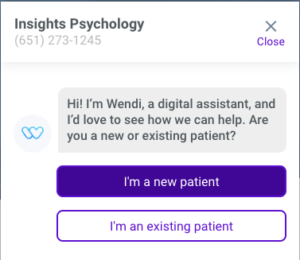Bridge to Mindfulness
Insights Psychology provides mental health services for all ages in person and online. We offer individual therapy, couples counseling, family therapy, psychological evaluations, and medication management services.
HIPAA Secured online form opens in a new tab.

Achieve your potential
Key Services

Psychotherapy
We offer counseling to individuals, couples, and families.

Psychological Evaluations
We offer comprehensive evaluations to children, teens and adults.

Medication Management
Consultation and follow up by psychiatry providers.

Clinical Training
On the job training opportunities with us.
Specialized mental health services

Insights Psychology founder, Dr. Hina Siddiqui.
Your wellness is our goal.
We provide a safe and friendly environment where you will feel heard and understood.
Help is just a click away!
At Insights Psychology, we offer services in person. Want to avoid the driving time, arrange transportation or childcare to attend your appointment? See our providers from the safety of your home using our secure telehealth services. Our scheduling and intake process is easy, smooth, and paperless.

Testimonials
Words really don’t do justice for my appreciation for Dr. Siddiqui. I have been in counseling since I was 9, I’m now 40. For the first time in my life, I feel like there is hope, and I can see a future. If you’re willing to do the work, she’s a great asset to have in your arsenal.
~ Client
~ Client
They want to make a difference
~ Client
I feel April and I are able to work together very effectively. I do trust her
~ Client
I worked with Dr Siddiqui most of 2023 to help deal with a traumatic event and other issues and found her to be an excellent resource. I’m very appreciative of the ways I’ve been able to grow due to our sessions. Very much recommended.
~ Client
Mollie is a very good listener, reflects on what I'm saying, and provides ideas on how to change my behavior in positive ways.
~ Client
Therapy has been extremely beneficial for me. My therapist is very caring.
~ Client
I’ve been having conflicts with my adult daughter on and off for several years. It was to the point that communication had become almost non-existent and typically ended with phone call hang-ups or arguments.
The worry and stress I was experiencing was causing great concern and perhaps, inadvertently, affecting my health. After reading an article re the benefits of therapy, I found Dr. Hina Siddiqui of Insights Psychology. I was hesitant to contact her – did I really need a therapist? Perhaps the problems were all mine. I didn’t think so, but the urge to discuss this with someone was growing. I took the leap… glad I did.
~ Client
Excellent establishment
~ Client
Mollie has a gentle approach that is helping me toward being more gentle with myself. I feel immense gratitude for having Mollie as a part of my support team.
~ Client
Kari is wonderful to talk to. She keeps information and is able to recall specific things from one session to the next and beyond. She is insightful and helps me navigate my feelings and allows me to direct a lot of the process and provides feedback as appropriate.
~ Client
Click here to read more testimonials from our clients and colleagues
Our Insurance Partners
Coverage for our services is supported by our in-network insurance partners.

You can also opt for self-pay.
Frequently Asked Questions
Who is a psychologist, and how can they help me?
Psychologists are professionals who study the mind and behavior. They can help individuals deal with mental health issues or mental health disorders, emotional challenges, relationship problems, and various other aspects of life.
They can help you by providing therapy, counseling, and interventions to address various mental health issues such as anxiety, depression, trauma, and relationship problems.
They use evidence-based techniques to help individuals improve their well-being, cope with challenges, and achieve personal goals. Additionally, psychologists can conduct assessments and evaluations to diagnose mental health conditions and develop personalized treatment plans.
Insights Psychology providers are psychology specialists offering services to clients in Woodbury and Bloomington, MN.
What is evidence-based psychotherapy?
Evidence-based psychotherapy refers to therapeutic methods and interventions that have been scientifically tested and proven effective through rigorous research.
These therapies are grounded in empirical evidence, meaning they rely on data and outcomes from studies to inform their approaches and techniques. By adhering to treatments that have been shown to work for specific disorders or problems, evidence-based psychotherapies aim to provide the most effective care possible.
Some well-known examples of evidence-based psychotherapies include Cognitive Behavioral Therapy (CBT), Dialectical Behavior Therapy (DBT), Acceptance and Commitment Therapy (ACT), Eye Movement Desensitization and Reprocessing (EMDR), Accelerated Resolution Therapy (ART), Internal Family Systems (IFS), among others.
What is supportive therapy and how is it helpful?
Supportive therapy is a warm, compassionate approach to therapeutic care that focuses on building a strong, supportive relationship between you and your therapist. Its core resides in creating a nurturing environment that fosters a sense of safety, acceptance, and understanding. In this gentle space, you're not just heard; you're deeply understood and valued for who you are, with all your unique experiences and perspectives.
Supportive therapy is like having a trusted partner on your journey towards mental wellness. It emphasizes the importance of empathy, active listening, and unconditional positive regard. Remember, taking the first step towards seeking help is a sign of strength, and in this journey, you’re never alone.
What types of issues do psychologists address?
Psychologists are dedicated to helping individuals confront a variety of mental health challenges, ranging from emotional distress and cognitive barriers to interpersonal dilemmas.
Whether managing anxiety, battling depression, navigating stress, recovering from traumatic events, overcoming addictive behaviors, resolving relationship dynamics, or addressing developmental and personality complexities, they offer holistic care.
Additionally, the interplay between our mental and physical well-being is significant as our bodies often reflect the state of our minds.
Understanding one's motivation, bolstering self-esteem, mastering learning strategies, and developing effective coping mechanisms are also within the realm of a psychologist's support. If you are experiencing any such difficulties, know that your path to a healthier, more fulfilling life is within reach.
How do I know if therapy is right for me?
Determining if counseling or therapy is the right choice takes some thought. Ask yourself — are personal issues making life and relationships tough? Are you experiencing overwhelming feelings?
Are you feeling stuck? Are you having difficulty navigating through life transitions? If it's hard to handle everything alone, counseling could be a supportive option.
Also, if you're ready to learn more about yourself and work together with a therapist, it might be a good fit. Talking to a therapist can provide you with answers on whether it suits your personal needs and life goals. Remember, it's okay to reach out for guidance, and taking this step is a sign of strength.
What's the difference between a therapist, psychologist, and psychiatrist?
In the world of mental health, you may come across therapists, psychologists, and psychiatrists. While they all aim to support mental well-being, they have distinct roles and expertise.
Therapists can go by various job titles like licensed professional counselor (LPCC), licensed clinical social worker (LICSW), or marriage and family therapist (LMFT). This title covers a range of professionals providing counseling or therapy. Generally, therapists hold master's degrees in counseling or similar fields. They work with individuals, couples, families, or groups to offer guidance through challenging emotional or mental health issues.
Psychologists typically have a doctoral degree in psychology (Ph.D. or Psy.D.). They are trained to assess, identify, and treat mental health problems. This might include therapy, and conducting psychological assessments, and sometimes they are involved in research and teaching too.
Psychiatrists are medical doctors (M.D. or D.O.) specializing in mental health. They are qualified to prescribe medication for mental health conditions and may provide therapy. They usually see patients with more complex or serious mental health challenges.
Regardless of their titles, these experts play pivotal roles in mental healthcare. Understanding their qualifications and services can help you decide who could best address your mental health needs.
How do I know if I should choose to work with a psychologist vs a psychiatrist?
Deciding whether to see a psychologist or psychiatrist can be confusing. Here’s a simple guide to help. A psychologist specializes in talk therapy. They’re all about listening and giving advice to tackle life’s emotional and mental challenges.
They won’t prescribe meds, but they're great at offering new perspectives and skills to handle tough situations. On the other hand, a psychiatrist is a go-to for diagnosing and treating your mental health conditions with medications.
They have a background in medicine and prescribe medications. If your problems feel manageable and you're open to talking instead of taking medication, a psychologist might be right up your alley.
But if things are more serious, or you think medicine might be part of the mix, a psychiatrist could be the better bet. Sometimes, a tag team of both is the best way to go.
What are the types of Psychologists?
Psychologists are like guides in the landscape of the mind, and they come in different specializations:
Clinical Psychologists: They're the problem-solvers for mental health, working out the puzzles of the mind and emotions to help heal from disorders.
Counseling Psychologists: Think of them as life coaches for the soul, aiding individuals through the ups and downs of daily life and boosting overall happiness.
School Psychologists: These are the guardians of young minds, nurturing children's learning and emotional well-being within schools.
Industrial-Organizational Psychologists: They are the architects of better workplaces, crafting strategies to improve how happy and productive employees are at work.
Forensic Psychologists: Mixing psychology with the law, they provide insights into people's minds within the courtroom and help solve legal mysteries.
Developmental Psychologists: Chroniclers of life’s stages, these experts study how we grow and evolve from infancy through old age.
Experimental Psychologists: The scientists amongst psychologists, experimenting to unravel the whys and how’s of our actions and thoughts.
Social Psychologists: They explore the social seas of human interaction, studying how the presence of others affects one’s behavior.
Health Psychologists: These professionals are the bridge between mind and body, examining how our thoughts and feelings influence our health.
Neuropsychologists: They are the detectives of brain function, investigating the ties between brain health and how we think and act, especially after a brain injury or with neurological conditions.
For anyone seeking help or understanding in areas touching on mental health, there are specialists available, like the clinical psychologist or counseling psychologist, ready to provide support and expertise. Get in touch with Insights Psychology's support team for more help.
What types of therapy does Insights Psychology offer?
At Insights Psychology, we are deeply committed to fostering a journey of healing, self-discovery, and empowerment.
Our approach to therapy is rooted in compassion, support, and a profound respect for your unique path toward better mental health.
We understand that each individual brings their own story, challenges, and aspirations to therapy, that's why we offer a diverse range of therapeutic modalities, tailored to meet you where you are in your journey.
We offer individual, couples, and family therapy.
In addition, we offer mindfulness and holistic therapies that encourage a deeper connection between mind, body and spirit.
How do I choose the right psychologist for me?
Selecting a qualified psychologist is a multi-step process. Begin your search by identifying local mental health experts with a focus on the specific type of therapy you desire, such as cognitive-behavioral therapy.
Verify their licensure and professional background to ensure they possess the necessary qualifications for your mental health needs. It's important to find a therapist whose methodology resonates with your personal therapy preferences.
A preliminary consultation or discussion might help assess whether their approach to mental health treatment matches what you’re looking for. Personal references from those within your circle or trusted healthcare providers can also guide your decision.
The therapeutic relationship should be built on mutual comfort and trust, essential components for successful mental health outcomes. Take note of how at ease you feel in the psychologist's presence right from the start.
Other practical considerations include the therapy expenses, session timings, office location, and whether they accept your insurance plan. Trust in your intuition as you choose a mental health professional. Opt for a psychologist who instills a sense of confidence, offering a therapeutic partnership conducive to achieving your wellness objectives.
What can I expect during my intake session?
The first therapy session typically involves an introduction where your mental health provider (therapist, psychiatrist, or psychologist) gathers information about your background, current concerns, and history.
They will also discuss confidentiality, the therapy/medication management process, and any questions or concerns you have.
What can I expect during an ongoing therapy session at Insights Psychology?
During a therapy session at Insights Psychology, you can expect a safe and confidential environment where you can openly discuss your thoughts, feelings, and experiences with a trained professional.
The therapist will listen actively, provide support, offer insights, and help you explore and understand your emotions and behaviors. Sessions may involve discussing challenges, setting goals, learning coping strategies, and working towards personal growth and positive change.
How long does therapy last at Insights Psychology?
At Insights Psychology, the length of psychotherapy is tailored to each person's unique situation and objectives.
Individuals tackling a particular concern might find a handful of sessions sufficient, whereas more complex or deep-rooted issues could warrant ongoing support over numerous months or years.
Key elements that influence this timeline include the specific challenges being faced, the patient's rate of advancement, and the type of therapeutic methods implemented.
By aligning with personal development and addressing mental health intricacies effectively, therapy is customized to offer optimal benefits.
How often will I need to attend therapy sessions?
The number of times you go to therapy can be different for everyone. It usually depends on what you want, what you need, and what your therapist suggests.
Most people have therapy once a week or every other week when they start.
As you begin to feel better and make mental health progress, the number of sessions might change.
Remember to talk with your therapist to figure out what's best for you. Each person's therapy is personalized to fit their life.
Can my psychologist write prescriptions?
In general, clinical psychologists are not allowed to give prescriptions for medications—they're not medical doctors.
But there are a couple of states in the United States, like Louisiana and New Mexico, where they can prescribe after getting special training.
However, in most US states, including Minnesota and Wisconsin, psychologists do not have that power.
Rather, prescribing medicine is usually something that medical doctors, nurse practitioners, and psychiatrists do.
Still, psychologists are important for other reasons! They talk with people and help them through therapy and counseling.
Can I use insurance to cover therapy costs?
Most health insurance policies help pay for mental health care, such as sessions with therapists or psychologists.
Each plan is different, so it's a good idea to look at your insurance information or talk to your insurer to understand if they cover these services.
Some insurance plans may have specific requirements or limitations for mental health coverage, such as a limited number of therapy sessions or only covering certain types of therapy.
It's also important to keep in mind that not all therapists or psychologists may be covered under your insurance plan.
Some policies may only cover services from providers within their network, while others may allow you to see any licensed professional.
What are the limits to confidentiality?
Confidentiality in mental health has legal and ethical limits to ensure the safety and well-being of the patient and others.
These limits typically include situations where there is a risk of harm to the patient or others, such as cases of imminent danger, abuse, or threats of violence.
Mental health professionals are mandated reports and may need to breach confidentiality if required by law, such as reporting child abuse or adult abuse, or when subpoenaed by a court.
Additionally, in some cases, confidentiality may be breached if the patient consents to share information or if it's necessary for the patient's treatment.
Will my therapist record my therapy sessions?
Your therapist will not record your sessions unless they specifically take your verbal and written consent to do so.
Recording of sessions may happen if your therapist is a student in a doctoral program where they are provided feedback on their clinical skills by their supervisor.
Sometimes recording may be needed in case your psychologist is obtaining additional certification in their field of practice (e.g. Board certification by American Board of Professional Psychology).
Recordings are confidential and are only shared with other mental health professionals.
Please be aware that you can revoke your consent at any time. If you have concerns about session recordings, it's important to communicate them openly with your therapist or psychologist.
What if I'm unable to afford therapy?
If you're unable to afford traditional therapy, there are some other options available.
Many communities have mental health centers that offer services on a sliding scale based on income. Look for support groups in your area or online that focus on your specific concerns or issues.
While not the same as therapy, they can offer valuable support and resources. There are many online resources and self-help tools available for managing mental health concerns, such as apps, websites, and online forums.
In addition, there are numerous self-help books and workbooks available that can guide you through various therapeutic techniques and exercises.
Some universities with psychology programs offer low-cost or free therapy sessions provided by graduate students under supervision. If you have access to an EAP through your employer, they may offer free or discounted therapy sessions.
Remember that while these options can be helpful, they may not be a substitute for professional therapy, especially in cases of severe mental health issues. If your situation allows, it's important to prioritize seeking professional help when possible.
What can therapy for eating disorders help with?
Eating disorders often coexist with a spectrum of emotions—fear, guilt, shame, anxiety—that can feel overwhelming.
Therapy provides a compassionate space to explore these emotions, offering guidance and support as you learn to navigate them with greater understanding and resilience.
Through this process, we develop your healthier coping mechanisms, replacing negative thinking patterns and behavior with strategies that support your emotional and psychological health.
One of the main benefits of therapy in the context of eating disorders is the journey towards rebuilding a healthy relationship with food and body image.
This path involves untangling complex feelings about food, eating, and body perception, guided by the gentle support of your therapist.
Together, you'll explore the roots of these perceptions, working towards a place of acceptance and appreciation for your body's unique beauty and strength.
The goal is not just to change eating habits but to foster a holistic sense of wellness and self-compassion.
How do I schedule an appointment with Insights Psychology?
Scheduling a mental health appointment at Insights Psychology is smooth, paperless, and easy to navigate.
a) On our website, you’ll find a ‘Contact Us’ form. Please fill this out if you have any specific questions for us.
c) If ready to move forward with setting up an appointment, click on ‘Request an Appointment’ and fill out our form with details (your name, date of birth, insurance, etc). Forms embedded on our website are HIPAA secure and encrypted so any information you submit will be securely relayed to us.
d) You can fill in your details on our on-site widget “Wendi” which will be able to do an instant insurance verification for you. here is a screenshot reference for you
e) You are welcome to call our office at 651-273-1245 or send us an email at [email protected].
Our dedicated administrative team is here to answer your questions, provide further information, and help you feel at ease as you take this step.
Depending on your request, we assign you providers that you would specifically like to work with. Otherwise, we provide options to you about providers who are accepting new patients. Once our administrative staff verifies your insurance, they will set you up with our client portal account.
- You can complete and submit the intake paperwork through the portal.
- Once we have your paperwork, we will finalize your appointment.
- You will receive an email confirmation regarding your appointment details including your provider, location, and time.
What should I do if I need to cancel or reschedule an appointment?
To cancel or reschedule a mental health appointment, it's important to do so as soon as possible, at least 48 hours before the scheduled appointment time.
This allows us to adjust our schedule accordingly and, if necessary, offer the time slot to another client who may be waiting for an appointment. If you cancel the appointment less than 48 hours in advance, we charge $200 as our late cancellation fee.
What is a treatment plan in mental health?
A treatment plan in mental health is a comprehensive document outlining the goals, strategies, and interventions designed to address an individual's mental health concerns.
It typically includes information about the diagnosis, specific symptoms, treatment modalities (such as therapy, medication, or alternative interventions), frequency of sessions, and measurable objectives to track progress.
Typically, therapists may monitor progress regularly, such as every session or every few sessions, to assess how you're responding to treatment and to adjust therapy accordingly.
Treatment plans are usually developed collaboratively between the individual and their mental health provider to ensure personalized care and optimal outcomes. Treatment plans are reviewed/updated every three months to note progress in therapy and make updates to goals.
How do I know I’m making progress in therapy?
Progress in therapy can manifest in various ways, such as increased self-awareness, improved coping skills, better relationships, setting and achieving goals, feeling better, increased insight, enhanced problem-solving abilities, increased resilience, greater self-acceptance, and improved day-to-day functioning.
Ultimately, progress in therapy is personal and can vary from person to person.
It's important to discuss your goals and track your progress with your therapist regularly to ensure you're moving in the right direction.
What qualifications and experience do providers at Insights Psychology have?
Psychologists, therapists, and psychiatrists at Insights Psychology have a significant amount of clinical experience.
Dr. Siddiqui, Muhammad, Mills, Benson, & Houghton, clinical psychologists on our team have over 10 years of clinical experience.
Dr. Amy Carrison has over 20 years of experience as a LADC and over 5 years of expertise as a licensed psychologist.
Drs. Newhouse & Kallberg were licensed in 2023.
Our providers have expertise in different areas and types of treatment modalities. For instance, Dr. Siddiqui has expertise in trauma treatment and offers EMDR and ART.
Dr. Mollie Newhouse has expertise in eating disorders, adjustment to disability, and trauma.
Dr. Kallberg has expertise in body dysmorphic disorder, and trauma. She is also trained in IFS therapy.
Dr. Amy Carrison has expertise in psychological testing including autism evaluations, ADHD evaluations, and learning disability assessments.
Our clinical supervisors Drs. Benson, Mills, & Houghton have expertise in clinical supervision. We have pre-licensed providers who are completing their doctoral degrees and gaining clinical experience and training at Insights Psychology.
Our post-doctoral residents are completing clinical hours required for licensure. Additionally, all our qualified psychologists and therapists are culturally competent and provide care that is tailored to their patient’s unique needs, circumstances, and backgrounds.
Drs. Siddiqui and Muhammad are bilingual and provide services in Hindi & Urdu.
Please see our provider reviews on Google and on our website if you would like to learn more about patient's experiences in working with our providers.
What ages do you work with?
At Insights Psychology, we work with children starting 6 years and older, teens, adults, and seniors.
Our clients range from ages 6 to 80 and older.
Our online therapists, psychologists and psychiatrists can offer care to clients in rural and suburban areas in MN.
How is the therapy approach different between a child, teen, and adult?
Therapy approaches can vary based on the developmental stage and specific needs of the individual.
With children, therapy often involves play therapy and activities to help them express themselves.
Teen therapy may incorporate more cognitive-behavioral techniques and exploration of identity issues. In adult therapy, the focus might be on introspection, problem-solving, and addressing deeper emotional issues.
However, these approaches can overlap depending on the therapist's style and the client's unique circumstances.
Can therapy help with depression and anxiety?
Yes, therapy can be very beneficial for managing anxiety and depression. Therapists can provide support, guidance, coping strategies, and tools to help individuals better understand and manage their symptoms.
Different types of therapy, such as cognitive-behavioral therapy (CBT), dialectical behavior therapy (DBT), and mindfulness-based therapy, can be effective in treating these conditions. It's important to find a therapist who you feel comfortable with and who specializes in treating anxiety and depression.
Is it necessary to do a combination of therapy and medication management to treat my mental health?
Whether a combination of therapy and medication management is necessary for treating your mental health depends on various factors, including the specific condition you're dealing with, its severity, your personal preferences, and your healthcare provider's recommendations.
In many cases, a combination approach can be beneficial as therapy and medication can complement each other, addressing different aspects of mental health issues.
However, some individuals may find success with either therapy or medication alone.
It's essential to discuss your options with a qualified healthcare professional to determine the best course of treatment for you.
What happens if I have an emergency or crisis between sessions?
If you have an emergency or crisis between therapy sessions, it's important to have a plan in place.
Most therapists provide guidelines on what to do in case of an emergency, such as contacting emergency services, a crisis hotline, or a trusted friend or family member.
Our practice does not provide on emergency coverage in the evenings or weekends.
If you have a life-threatening emergency or are unable to keep yourself safe, please go to the nearest emergency room.
Can my individual therapist work with other members of my family?
Therapists typically work with only one member of a family if they are seeing them for individual therapy. Depending on the referral, other family members may be involved. For instance, an individual therapist might work with the partner or significant other of their client for a couple of sessions. This approach can help address family conflicts, communication issues, or other relational challenges.
What should I do if I see my therapist in a public place?
If you see your therapist in a public place, it's generally up to you how you want to handle the situation.
If you feel comfortable, you can approach them and say hello briefly. If you prefer to maintain your privacy, you can choose to ignore them and continue with your activities.
If you're unsure, you can gauge the situation and decide what feels right for you in the moment.
Remember, your therapist is bound by confidentiality and won't acknowledge your relationship unless you initiate it.
Can I give gifts to my therapist or mental health provider?
While your appreciation is understandable, it could create a complicated dynamic in the therapeutic relationship. Instead, expressing gratitude through words or a thoughtful card can be more appropriate.
If you feel compelled to give something, it's best to discuss it with your therapist first to ensure it aligns with professional boundaries.
What is the cost of therapy sessions?
At Insights Psychology, our therapy sessions cost between $200-$300 and this depends on the duration of the session.
Costs for therapy covered by insurance is determined by the contracted rates.
Clients using insurance may have a deductible and copay. To know the exact cost for mental health services it is best to contact your insurance provider as plans and payers differ in their coverage.
For clients who do not have insurance, have limited financial resources we offer sliding scale fees or reduced rates based on income.
Please contact our clinic front desk at 651-273-1245 if you want to learn about our sliding fee options.
How do I know my therapist is sensitive to my gender identity and sexual identity?
Finding a therapist who is sensitive to your gender identity and sexual orientation is crucial for effective therapy. Here are some signs to look for.
-
- Your therapist should use inclusive language and ask about your preferred pronouns. They should have a good understanding of diverse gender identities and sexual orientations.
- A sensitive therapist will create a safe, non-judgmental space where you feel comfortable discussing your identity. Look for a therapist who has training and experience working with LGBTQ+ clients.
- A sensitive therapist will respect your boundaries and not make assumptions about your identity. They should support your self-discovery and identity exploration without pushing you in any particular direction.
- A good therapist will ask for feedback and be willing to adapt their approach to meet your needs.
If you're unsure, don't hesitate to ask directly about their experience and approach to working with LGBTQ+ clients. Trust your instincts and seek out a therapist who makes you feel understood and supported.
When is therapy not helpful?
Therapy may not be helpful when there's a lack of trust or rapport between the therapist and the client, when the client isn't ready or motivated to engage in the process, or when the therapeutic approach doesn't align with the client's needs or preferences. Additionally, therapy may not be effective if there are underlying medical issues that need to be addressed first, such as medical, substance abuse, or untreated psychiatric conditions.
For Patients
Request an Appointment (HIPAA Secure)
*Opens in a new tab
Make a Referral (HIPAA Secure)
*Opens in a new tab
Client Feedback (HIPAA Secure)
*Opens in a new tab









